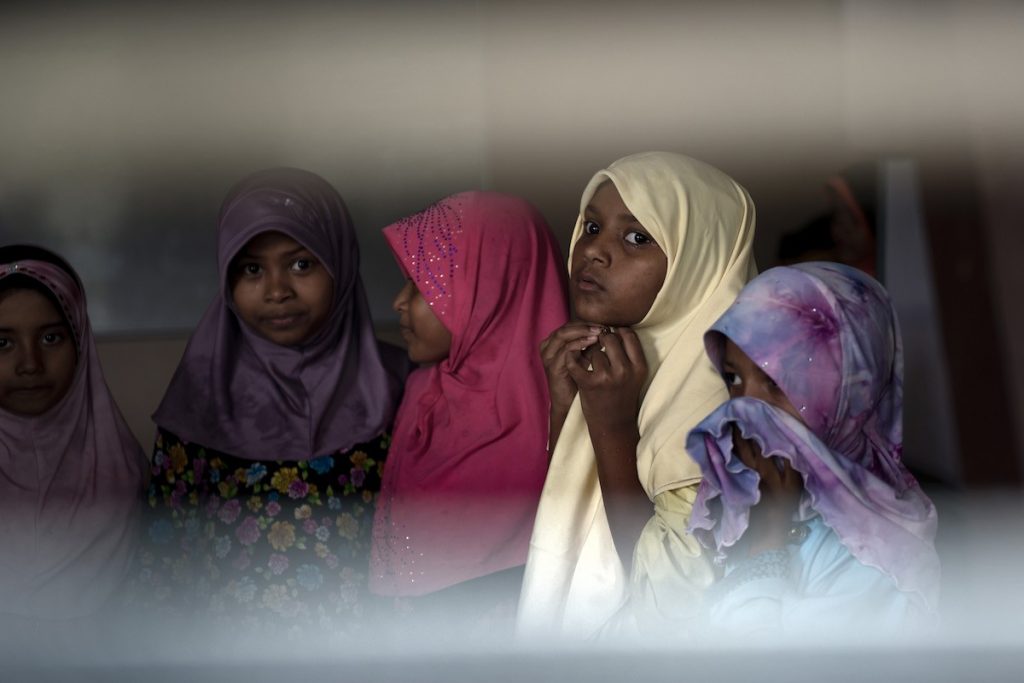
Pope Francis has said that refugees forced to flee their homes often end up in a “desert of humanity.”
The pope made the remark in a message celebrating the 40th anniversary of a Jesuit-run refugee center in Rome.
“The last 40 years of human history have also not been a linear progression: the number of people forced to flee their homelands continues to grow,” he wrote in the letter dated Nov. 7.
“Many of you have had to flee from living conditions comparable to those of slavery, where at base is a concept of the human person deprived of his or her dignity and treated as an object.”
“You know how terrible and despicable war can be, you know what it means to live without freedom and rights, you watch helplessly as your land dries up, your water becomes polluted, and you have no other option but to set out towards a safe place where you can realize your dreams and aspirations, where you can use your talents and skills.”
“Unfortunately, in many cases, setting out has not been a true liberation. All too often you come up against a desert of humanity, with an indifference that has become global and that dries up relations between people.”
The Astalli Center, run by the Jesuit Refugee Service, is marking its anniversary with a photography exhibit called “Faces toward the Future,” featuring portraits taken in Rome by the photojournalist Francesco Malavolta.
The show opened on Nov. 16 at the Church of St. Andrew on the Quirinal in the presence of Cardinal Angelo De Donatis, vicar general for the Diocese of Rome, and Cardinal Michael Czerny, S.J., under-secretary of the Migrants and Refugees Section of the Vatican’s Dicastery for Promoting Integral Human Development.
In his address, Czerny recalled that the Jesuit Refugee Service was founded in 1980 by Jesuit Superior General Fr. Pedro Arrupe after he witnessed the plight of hundreds of thousands of South Vietnamese refugees fleeing by boat following the Vietnam War.
The Czech-born Canadian cardinal said: “In these 40 years the Spirit has continued to speak, better to cry out, through the lives of women and men whose dignity is wounded, who are fleeing from conflict, climate change, and poverty.”
“Accompanying, serving and defending was the response suggested at the beginning by Arrupe and that over time has found concrete form in the goodwill of so many women and men who, also at Centro Astalli, have placed themselves side by side with people in history’s existential peripheries.”
“The future of humanity passes through the social inclusion of migrants, peacebuilding, and social dialogue. The condition for building inclusion, justice, and peace is to ‘walk together.’”
The Astalli Center said in April that many refugees who have lived independently in Italy for years returned to the charity in 2020 with worries about unemployment, paying bills, monthly rent, and schooling for their children.
At the same time, the number of migrants arriving in Italy by sea tripled last year as the country battled the coronavirus pandemic.
Pope Francis visited the Astalli Center on Sept. 10, 2013, months after his election. In an address, he thanked staff for showing “that with acceptance and brotherhood it is possible to open a window on the future.”
In his Nov. 7 message, the pope said that in recent decades conflicts, nationalism, and populism had aggravated the plight of refugees. He criticized governments for relying on “the construction of walls and the return of migrants to unsafe places” to manage migration.
But he said that the courage and perseverance of refugees were inspiring.
He concluded his letter by asking Fr. Arrupe, who died in 1991 and whose cause of canonization officially opened in 2019, to watch over the Rome center and the whole Jesuit Refugee Service.
Source: Licas Philippines
0 Comments